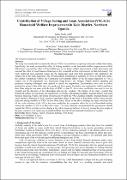| dc.contributor.author | Ocen,Tom | |
| dc.contributor.author | Akello, Judith Abal | |
| dc.date.accessioned | 2022-06-01T11:26:37Z | |
| dc.date.available | 2022-06-01T11:26:37Z | |
| dc.date.issued | 2022 | |
| dc.identifier.citation | Contribution of Village Saving and Loan Association (VSLA) to Household Welfare Improvement in Kole District- Northern Uganda. (2022). European Journal of Business and Management. https://doi.org/10.7176/EJBM/14-10-01 | en_US |
| dc.identifier.uri | doi.org/10.7176/EJBM/14-10-01 | |
| dc.identifier.uri | https://hdl.handle.net/123456789/410 | |
| dc.description.abstract | Abstract
The study was conducted to examine the effect of VSLA loan activities on poverty reduction in Bala Sub-county.
Specifically, the study examined the effect of lending modality on the household welfare improvement in Bala
Sub-county, assessed the effect of financial literacy on the house welfare improvement in Bala Sub-county and
assessed the effect of small business financing on the household welfare improvement in Bala Sub-county. The
study employed cross-sectional design and the approaches used were both quantitative and qualitative; the
sample size of the study population was 110 respondents comprising of members of VSLA in Bala Sub-county,
the District Commercial Officer and Community Development officer. From the target population of 110, a
sample size of 86 respondents was determined using Krejcie and Morgan. Simple random sampling and
purposive sampling techniques were applied to sample the respondents. Questionnaires were used to collect
quantitative primary data while interview guide and focus group discussion was employed to collect qualitative
data. Data analysis was done with the help of SPSS version 23. Correlation coefficient was used to test the
strength and the direction of the relationship between the variables. The finding of the study revealed that
household welfare was positively and significantly correlated with lending modality, financial literacy and small
business financing. Finally, the results of regression revealed that VSLA lending modality, financial literacy and
small business financing all had a positive significant effect on the level of household welfare hence poverty
reduction among members of VSLA in Bala Sub-county. Based on the above findings, the study concluded that
all the credit activities of the VSLA that were studied by the researcher affect the level of household welfare
among the member of VSLA in Bala sub-county. The study therefore recommended that government should
support the VSLA activities as it is playing a big role in reducing the level of poverty among the poor people at
the grass root level who cannot access credit facilities from the formal financial institutions in Uganda. | en_US |
| dc.language.iso | en | en_US |
| dc.publisher | European Journal of Business and Management | en_US |
| dc.subject | Micro-Finance | en_US |
| dc.subject | Family | en_US |
| dc.subject | Financial Literacy | en_US |
| dc.subject | Well-being | en_US |
| dc.title | Contribution of Village Saving and Loan Association (VSLA) to HouseholdWelfare Improvement in Kole District- Northern Uganda | en_US |
| dc.type | Article | en_US |

